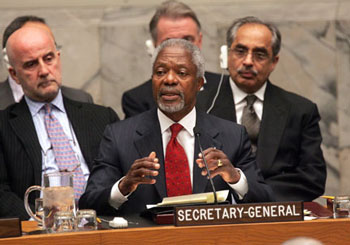- Annan: Iraq worse than under Saddam (FCN, 12-10-2006)
- Annan: Perceived ‘double standard’ at UN is a problem (FCN, 10-08-2002)

UNITED NATIONS (FinalCall.com) – As United Nations Secretary-General Kofi Annan was scheduled to leave office on December 31, he decided to use the platform provided to him as the outgoing head of the world body to say some rather strong comments to the United States and Israel.
His first venue was on December 11 at the Harry S. Truman presidential library in Independence, Mo., where he said the UN needed far-sighted leadership from the U.S.
“More than ever today, Americans, like the rest of humanity, need a functioning global system through which the world’s peoples can face global challenges together. And in order to function, the system still cries out for far-sighted American leadership in the Truman tradition,” the two-term secretary-general said.
Analysts say that Mr. Annan’s last public speech as secretary-general was an apparent dig at the Bush administration, which went to war in Iraq without UN authorization.
The Ghanian-born secretary-general said: “When power, especially military force, is used, the world will consider it legitimate only when convinced that it is being used for the right purpose, for broadly shared aims, in accordance with broadly accepted norms.”
“As Pres. Truman said, the responsibility of the great states is to serve and not dominate the peoples of the world,” he added.
He continued, “When it (the U.S.) appears to abandon its own ideals and objectives, its friends abroad are naturally troubled and confused.” Observers say that Mr. Annan was possibly referring to human rights abuses at Abu Ghraib prison in Iraq.
Mr. Annan’s second venue was the Security Council, where he delivered his last report on the situation in the occupied territories of Palestine. He said the tensions in the Middle East were “near the breaking point.” The secretary-general said that a final settlement of the Arab-Israeli conflict had defied the best efforts of several generations of world leaders, and he also would leave office without an end to the prolonged agony.
He addressed both parties with frank messages. To Israel he said: “Israel’s democracy could thrive only if the occupation over another people ended.”
To the Palestinian side, he said, “No resistance to occupation justified terrorism.”
Then waxing philosophical, Mr. Annan noted: “Hundreds of thousands of Israelis still live in territories occupied since 1967–and more than 1,000 were added monthly. As Palestinians watched that activity, they also saw a barrier being built through their land. Their despair at the occupation only grew, as did their determination to resist it.”
Israeli representative Daniel Cameron thanked the secretary-general for his many years of dedication to the UN. Concerning Mr. Annan’s speech, the ambassador observed, “His (Annan) remarks were unbiased and he referred to both sides of the issue. This was not the traditional narrative heard at the United Nations.”
But critics of Mr. Annan’s Missouri speech were not as diplomatic.
“Whatever one thinks of outgoing UN Secretary-General Kofi Annan, it’s clear that he suffers no shortage of chutzpah–as evidenced by his willingness to lecture the United States,” stated a December 13 editorial in the Washington Times.
The Times, published in the UK, stated: “The secretary-general of the United Nations used his farewell address to attack the Bush administration for unilateralism, in a speech that will raise cheers from its critics, but was extravagantly unfair.”
An editorial in The Korea Herald, published in South Korea, said the secretary-general’s speech was a “worthy call for collective responsibility, global solidarity, rule of law, mutual accountability and multilateralism.”
And New York’s Newsday said: “Annan was right to warn the United States that its lead in the global human rights movement can only be maintained if America remains true to its principles, even as it struggles against terrorism. And he correctly chided Washington for its unilateral approach to diplomacy.”
But Washington’s neo-cons were not kind in their analysis.
The Australian noted that Republicans Newt Gingrich, Norm Coleman and Henry Hyde “sharply rebuked” Mr. Annan.
Sen. Coleman, according to the article, said Mr. Annan’s “10 years as secretary-general represented failed leadership.”
Mr. Hyde, the retiring chairman of the house international relations committee, accused Mr. Annan of “presiding over rampant financial and moral mismanagement at the UN.”
Mr. Gingrich, former Speaker of the House, “mocked” the secretary-general on Fox News, saying he was a failure who was treated like a success out of politeness,” according to The Australian.
Secretary of State Condoleezza Rice also had something to say about the speech, according to the newspaper. Ms. Rice said Mr. Annan’s speech was a “missed opportunity” to highlight cooperation between the UN and U.S.
China lauded the outgoing UN chief, praising him for his “distinguished” work for world peace and prosperity. Jin Yongjan, chairman of the UN Association of China, said Mr. Annan could be ranked as one of the most “outstanding secretary-generals in the UN’s history,” according to a story in the China Daily.
And there is praise coming out of Africa. Back in November, Mr. Annan traveled to Addis Ababa, Ethiopia, where he attended the African Development Forum. He was bestowed with the honor of being a “Great African” by African Union Commission chairman, Alpha Oumar Konare.
“The outgoing UN secretary-general bowed out with a pugnacious speech at the Truman Library, yet the world remains divided on the worth of his legacy,” writes an editorialist in Egypt’s Al-Ahram Weekly.












